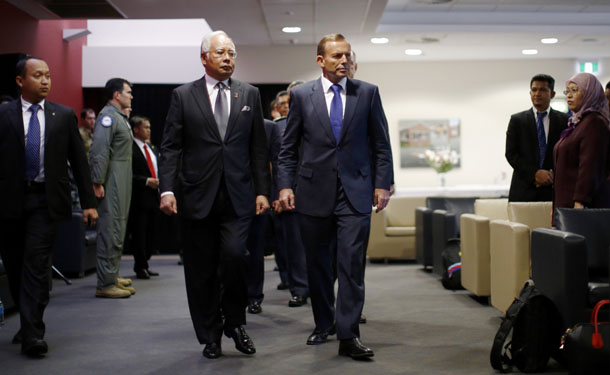PERTH/KUALA LUMPUR — Malaysia’s prime minister visited the Australian search base for missing Flight MH370 on Thursday as a nuclear-powered submarine joined the near-four week hunt that has so far failed to find any sign of the missing airliner and the 239 people on board.
Najib Razak joined his Australian counterpart Tony Abbott at RAAF Base Pearce, near Perth, where aircrews from seven countries have been flying dozens of missions deep into the southern Indian Ocean looking for debris from the Malaysia Airlines jet.
“The world expects us to do our level best, and I’m very confident we will indeed show what we can do together as a group of nations; that we want to find answers, that we want to provide comfort to the families and we will not rest until answers are indeed found,” said Najib, as the two leaders spoke to search and recovery team at the air base.
The Boeing 777 lost communications and disappeared from civilian radar less than an hour into an overnight flight from Kuala Lumpur to Beijing on March 8.
It was briefly picked up on military radar on the other side of Malaysia and analysis of subsequent hourly electronic “pings” sent to a satellite led investigators to conclude the plane crashed far off the west Australian coast hours later.
Retired Air Chief Marshal Angus Houston, the head of the Australian agency coordinating the operation, said an international air crash investigation team with analysts from Malaysia, the United States, Britain, China and Australia was continuing to refine the search area.
“Based on that continuing flow of information, the search area is being continually adjusted and today it will be adjusted to move the search area a little bit further to the north,” he told Najib and Abbott at the base.
Huge Search Area
On Thursday, up to eight planes and nine ships will join the search area of about 223,000 sq km (86,000 sq miles)—roughly the size of the US state of Minnesota—some 1,680 km (1,040 miles) west-north-west of Perth, he said.
Britain is also sending HMS Tireless, a Trafalgar-class nuclear submarine with sonar capabilities, to help with the search, Malaysia’s transport ministry said in a statement on Wednesday.
Sonar may help find the plane’s “black box” voice and data recorders, which only have an expected battery life of around 30 days and are key to unlocking what happened on the flight.
An Australian navy ship fitted with a US black box detector and unmanned submarine is also on its way to the search area.
But experts have warned the “Towed Pinger Locator” may be of little use unless investigators can get a much better idea of exactly where the plane went into water, because its limited range and the slow speed at which it must be pulled behind the ship mean it cannot cover large areas of ocean quickly.
On Monday it will be 30 days since the plane went missing.
Australia’s Abbott warned that the task would not be easy.
“We cannot be certain of success, but we can be certain of the professionalism and the effort that will be brought to the task,” he said.
Continued Criticism
Najib arrived in Perth with Malaysia coming under fresh fire for its handling of the incident, after authorities there changed their account of the plane’s critical last communication.
Malaysia on Tuesday released the full transcript of communications between the cockpit and local air traffic control.
While indicating nothing abnormal, the transcript showed the final words from the cockpit were not the casual “All right, good night” that authorities first reported, but the more standard “Good night Malaysian three seven zero.”
Malaysian authorities have faced heavy criticism, particularly from China, for mismanaging the search, now in its fourth fruitless week, and holding back information. Most of the 239 people on board the flight were Chinese.
Authorities have not ruled out mechanical problems as causing the disappearance, but say all the evidence suggests the plane was deliberately diverted from its scheduled route.
Malaysia’s police chief said the investigation was focusing on the cabin crew and pilots, after clearing all 227 passengers of possible involvement in hijacking, sabotage or having personal or psychological problems that could have been connected to the disappearance.















